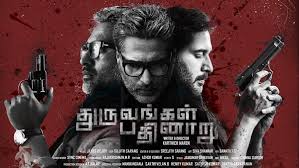Discover the battle between mind and muscle in South Indian cinema. Explore the psychological depth of thrillers versus the adrenaline rush of action-packed films. Which genre reigns supreme?
South Indian cinema has long been a powerhouse of storytelling, delivering a diverse range of genres that captivate audiences across the world. Among the most compelling are thrillers, which can be broadly categorized into psychological thrillers and action thrillers. While both genres deliver suspense and excitement, they do so in vastly different ways—one engaging the mind, the other igniting the senses.
This article explores the core differences between these two thriller sub-genres, their evolution in South Indian cinema, and their cultural impact.
Psychological Thrillers: Engaging the Mind
Characteristics of Psychological Thrillers
Psychological thrillers focus on the internal conflicts of characters, delving deep into their minds. These films often feature:
- Unreliable narrators
- Mind games and deception
- Dark and complex storytelling
- Exploration of human psychology and trauma
- Tension built through dialogue, atmosphere, and cinematography
Notable South Indian Psychological Thrillers
- Aparichithudu (2005) – Tamil
- Directed by Shankar, this psychological thriller explores multiple personality disorder with gripping storytelling and intense performances.
- Ratsasan (2018) – Tamil
- A chilling crime thriller that follows a cat-and-mouse chase between a serial killer and a determined cop.
- U-Turn (2016) – Kannada
- A supernatural psychological thriller that keeps the audience questioning reality.
The Appeal of Psychological Thrillers
The allure of psychological thrillers lies in their ability to challenge perceptions and keep audiences guessing. Unlike action thrillers, which rely on physical confrontation, psychological thrillers build suspense through intricate storytelling and character development.
Action Thrillers: The Power of Muscle
Characteristics of Action Thrillers
Action thrillers, on the other hand, deliver high-intensity sequences, often centered around physical prowess and larger-than-life heroes. These films typically include:
- High-energy fight sequences
- Explosive stunts and chase scenes
- Hero-centric narratives
- Straightforward good vs. evil themes
- Emphasis on visual spectacle
Notable South Indian Action Thrillers
- Vikram (2022) – Tamil
- A gripping action-packed thriller starring Kamal Haasan, featuring intense combat sequences and powerful storytelling.
- Kaithi (2019) – Tamil
- A fast-paced, adrenaline-pumping thriller where a prisoner fights against an army of criminals in a single night.
- Billa (2007) – Telugu/Tamil
- A stylish, action-packed film that redefined gangster thrillers in South Indian cinema.
The Appeal of Action Thrillers
The primary draw of action thrillers is their adrenaline rush. These films often feature protagonists overcoming insurmountable odds through sheer strength, skill, and determination, making them a favorite among mass audiences.
Psychological vs. Action Thrillers: Key Differences
| Feature | Psychological Thrillers | Action Thrillers |
|---|---|---|
| Focus | Mind games, suspense, psychological depth | High-energy action, stunts, physical combat |
| Storytelling | Slow-burn, intricate narratives | Fast-paced, linear plots |
| Audience Engagement | Keeps viewers thinking and questioning | Delivers instant gratification and thrill |
| Examples | “Ratsasan,” “U-Turn” | “Vikram,” “Kaithi” |
While psychological thrillers appeal to intellectual audiences, action thrillers cater to mainstream viewers seeking visual excitement.
The Cultural Impact of Thrillers in South Indian Cinema
South Indian cinema has successfully blended both sub-genres to create hybrid thrillers. Directors like Lokesh Kanagaraj, Shankar, and Mysskin have redefined how thrillers are made, often incorporating psychological depth into action-packed narratives.
Moreover, South Indian thrillers have gained international recognition, with films like Ratsasan and Kaithi being remade or adapted in other languages.
The battle between mind and muscle in South Indian cinema continues to intrigue audiences. Whether you prefer the cerebral tension of psychological thrillers or the high-octane spectacle of action thrillers, South Indian filmmakers have mastered the art of delivering both.
Ultimately, both genres serve different storytelling purposes, catering to distinct audience preferences. With evolving filmmaking techniques and rising global interest, South Indian thrillers will continue to push the boundaries of cinematic excellence.
FAQ
1. Which is more popular in South Indian cinema: psychological thrillers or action thrillers?
Action thrillers tend to have broader appeal due to their visual spectacle and mass-market appeal, but psychological thrillers have a strong cult following among cinephiles.
2. Who are the best directors for thrillers in South Indian cinema?
Directors like Lokesh Kanagaraj, Mysskin, Shankar, and Jeethu Joseph have excelled in crafting both psychological and action thrillers.
3. Are there any hybrid thrillers that combine both genres?
Yes, films like Vikram (2022) and Kaithi (2019) successfully merge psychological depth with high-action sequences.
4. Why are South Indian thrillers gaining global recognition?
Their unique storytelling, strong performances, and high production values have made them popular beyond regional audiences, leading to remakes and adaptations in multiple languages.
5. Which thriller sub-genre is better?
It depends on personal preference. Psychological thrillers offer intellectual engagement, while action thrillers provide an exhilarating experience. Both have their place in cinematic storytelling.
South Indian cinema’s thrillers are a testament to its evolving storytelling prowess. Whether you crave mind games or muscle fights, there’s a thriller waiting for you.
